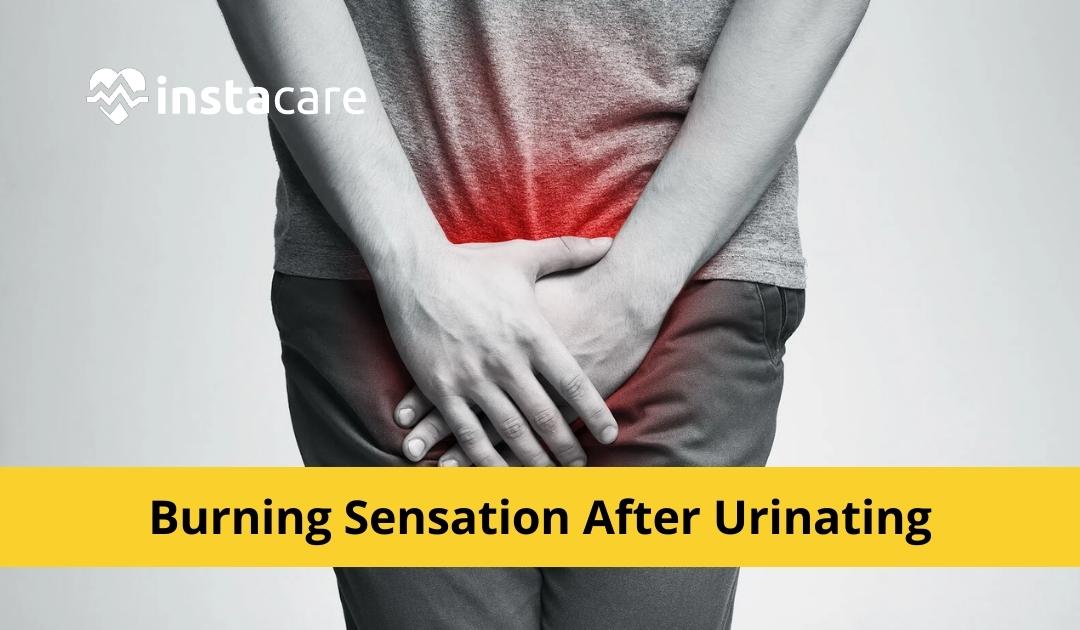Are you feeling an uncomfortable burning sensation when you use the restroom? This can happen to both men and women, and is known as Dysuria- a common symptom of urinary tract infections. Suffering from this condition can be distressing - after all, urination shouldn't hurt! While it definitely warrants seeing a doctor for diagnosis and treatment, there are some steps you can take at home to ease your discomfort. In this blog post we'll dive into the causes behind Dysuria, possible treatments, and practical ways to stop the burning sensation while waiting for medical care. Read on to learn more about how to deal with Dysuria naturally.
What is dysuria (painful urination)?
Dysuria, also known as painful urination, is a symptom that refers to discomfort or burning sensation when urinating. It is most commonly associated with urinary tract infections (UTIs), sexually transmitted diseases (STDs) such as gonorrhea and chlamydia, bladder infections called cystitis, and an inflamed prostate due to prostatitis. How to stop the burning sensation caused by dysuria can be addressed through lifestyle changes like drinking more water and avoiding caffeinated beverages, as well as medications prescribed by your healthcare provider. In some cases of UTIs, antibiotics may be recommended to prevent further infection. Finally, if you are experiencing a burning sensation during urination or other evidence of infection for more than three days, you should contact your physician for evaluation and appropriate treatment.
Who gets Burning Sensation After Urinating?
Burning sensation after urinating can be caused by a number of things, from a urinary tract infection to genital skin irritation. Those who experience this burning sensation should see their doctor for an evaluation. Most treatments for the burning sensation will focus on the underlying cause, but there are some methods that may help stop the discomfort in the short term. These method include drinking plenty of fluids, avoiding spicy and acidic foods, cutting back on caffeine and soda consumption, maintaining personal hygiene, wearing breathable undergarments, taking over-the-counter medications like Ibuprofen or Naproxen to reduce inflammation, and using topical creams or ointments recommended by your doctor to soothe the sensitive area.
What are the symptoms of dysuria (painful urination)?
Dysuria, or painful urination, is an uncomfortable symptom that can cause a burning sensation when you're trying to relieve yourself. Other symptoms of dysuria include frequent urge to urinate, pain in your bladder area, difficulty controlling the flow of urine, cloudy or bloody urine, and foul-smelling urine. How you should go about treating the symptom depends on the underlying cause for it. Drinking plenty of water throughout the day can be helpful in dispelling toxins from your body and providing relief from the burning sensation after you’re done urinating. Sometimes antibiotics may be necessary to treat any infections that are causing painful urination. If symptoms persist despite conservative treatments, you should consult with your healthcare provider to determine what other options are available for treating dysuria and ultimately getting rid of its uncomfortable effects.
Causes of burning sensation after urinating (painful urination)
Painful urination, also known as dysuria, is an uncomfortable or burning sensation in the bladder. Burning after urination is most often the symptom of a urinary tract infection, which is caused when bacteria invade the urethra and cause inflammation. Other potential causes include sexually transmitted infections like Chlamydia and Gonorrhea, bladder stones, kidney stones, side effects of medications, vaginal atrophy in post-menopausal women, or something more serious such as bladder cancer. How one stops the burning sensation depends on treating the underlying cause; for instance if a urinary tract infection is determined to be the culprit then antibiotics may be prescribed. It is important to realize that burning sensation after urinating may also be accompanied by other symptoms such as frequent and strong urges to pee, urgency to urinate more often than usual, pain in the genitals or abdomen and blood in urine among others so it is advisable to seek medical help if these additional symptoms are present.
Urinary tract infections
Urinary tract infections (UTI) are common and can be painful experiences due to a variety of causes. The most common cause of a burning sensation during or after urination is usually a sign that you are suffering from a UTI. These infections occur when bacteria travel up the urinary tract, infiltrating the bladder and other parts of the urinary system. Causes of this outcome can vary, but they often include poor hygiene, sexual activity, having improperly functioning equipment that give access to the urinary tract, or having an enlarged prostate gland. Seeking medical help is often recommended if there are any signs of infection so that one can quickly start on an effective treatment regimen.
Sexually transmitted infections (STIs)
Sexually transmitted infections (STIs) are a major health concern that can cause serious, lifelong health issues if left untreated. It is possible to contract an STI simply by engaging in unprotected sexual contact with someone who is infected. Causes of burning sensation after urinating, a common symptom of an STI, include but are not limited to chlamydia and gonorrhea. If you have any suspicions or concerns about potentially having an STI, it is important that you see a doctor immediately in order to receive a proper diagnosis and treatment plan. The earlier an STI is caught and treated, the better the prognosis; hence why it is so vital to seek medical advice as soon as possible after experiencing any abnormal symptoms.
Kidney stones
Kidney stones are small, jagged deposits made of minerals and acid salts that can form in the kidneys. While they may vary in size, they are typically no larger than a grain of sand. Kidney stones can be quite painful to pass due to their sharp edges and depending on their size, can take days or weeks to clear out of the body through urination. It is very common for people suffering from this condition to experience a burning sensation during urination as part of the passing process. This feeling is caused by the tiny stones rubbing against the walls of your urinary tract while they make their way through your body. If you are having an abnormal amount of pain or discomfort while urinating, then it might be wise to speak with a doctor about possible kidney stones.
Urethritis
Urethritis is an inflammation of the urinary tract caused by a bacterial or viral infection and can lead to unpleasant symptoms. The main symptom associated with urethritis is a burning sensation when passing urine, along with the frequent urge to go to the toilet that brings no relief. Other symptoms include abnormal discharge from the penis or vagina, pain during intercourse, and itching in the genital area. Although it can be uncomfortable, effective treatments are available that can help its resolution. Infections such as urethritis can be contracted through sexual intercourse so it's important to inform all partners of a diagnosis and practice safe sex behaviors.
View More: Blood In The Urine Hematuria - Symptoms Causes And Treatment
How to stop burning sensation after urinating?
Burning sensations after urinating can be uncomfortable and potentially embarrassing. Fortunately, there are a few steps you can take to help ease and eventually eliminate this discomfort. First, it’s important to stay hydrated by drinking plenty of liquids, as that helps flush out bacteria that may be irritating your urinary tract. You should also avoid applying lotions or perfumes around the genital area and use hygiene products labeled for sensitive skin instead. Additionally, avoiding spicy or acidic foods, alcohol and coffee may also help prevent burning during urination. If these methods don’t help or if the burning sensation persists, talk to your doctor to get further guidance in managing your symptoms. Taking these steps can help stop the burning sensation after you finish urinating.
Home remedies to stop the burning sensation after urinating
How to stop the burning sensation after urinating can be a difficult question to answer. Fortunately, there are several simple home remedies that can help soothe the discomfort and speed up your recovery. Drinking more fluids, such as plain water or diluted cranberry juice, is one way of counteracting the fiery sensation. You can also opt for herbal soups that contain ingredients like onion skins and parsley - which are believed to decrease inflammation in the urinary tract - or unsweetened yogurt which has been found to restore balance to bacteria levels in the bladder. Focusing on maintaining proper hygiene during urination, such as wiping front-to-back and avoiding holding your urine too long, will also help minimize the risk of infection and irritation from leftover residue near sensitive organs and skin.
When to see a doctor about dysuria?
If you’re someone who’s experienced the burning sensation that comes with passing urine, otherwise known as dysuria, you’ve likely wondered if you should seek medical attention. Dysuria isn’t usually a sign of anything serious, but is often a reaction to an infection or irritation in the urinary tract. How serious the underlying cause of dysuria is will determine when it’s appropriate to see a doctor. If your symptoms are minor and easily managed by over-the-counter medication such as Tylenol, they may not require further treatment. However, if your symptoms become more frequent and severe – irritating enough to distract you from everyday tasks – then it would be wise to contact your doctor immediately to have them checked out. This way, you can find out what might be causing the discomfort and learn how best to stop it.
Prevention tips for dysuria
Dysuria is a condition where one experiences the burning sensation after urinating. This can be extremely uncomfortable and even lead to further urinary tract infections if not taken care of correctly. To prevent dysuria, drink plenty of fluids throughout the day to help reduce any pain or soreness during urination. It is also important to keep yourself hygienic by showering routinely and keeping your genitals clean. Additionally, avoid irritants such as soaps, douches or feminine sprays that might contribute to or worsen the inflammation in the urinary tract causing the discomfort. Speak with your doctor about any medications that may be helpful, such as anti-inflammatory drugs or an analgesic cream, to put an end to the burning sensation before it gets worse.
Please book an appointment with the Best Nephrologist in Pakistan, Karachi, Islamabad, and all major cities of Pakistan through InstaCare, or call our helpline at 03171777509 to find a verified doctor for your disease.
Source: https://instacare.pk/blog/how-to-stop-burning-sensation-after-urinating












